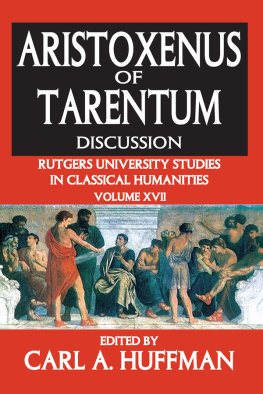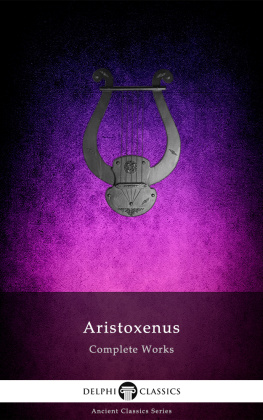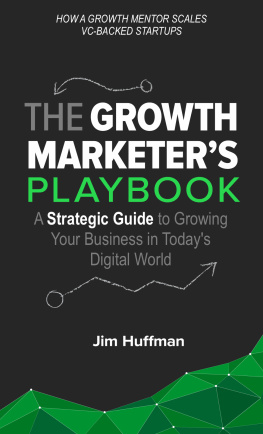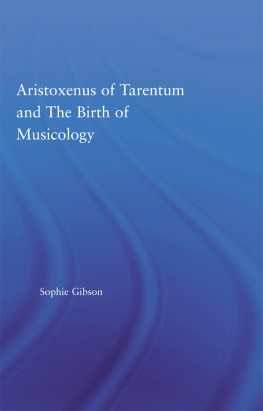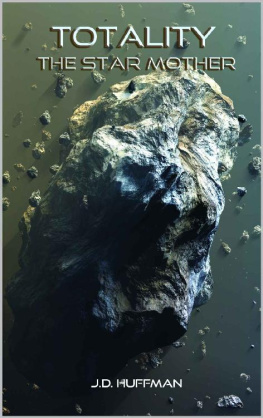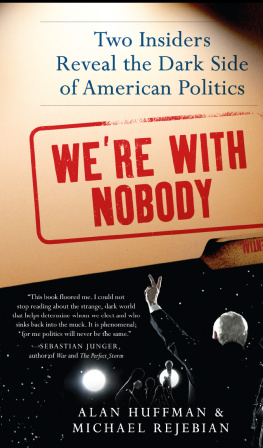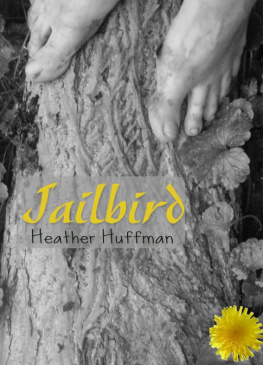
ARISTOXENUS OF TARENTUM
Rutgers University Studies in Classical Humanities
| Series Editor: | David C. Mirhady |
| Advisory Board: | William W. Fortenbaugh |
| Dimitri Gutas |
| Pamela M. Hubyv |
| Timothy C. Powers |
| Eckart Schtrumpf |
On Stoic and Peripatetic Ethics: The Work of Arius Didymus I
Theophrastus of Eresus: On His Life and Work II
Theophrastean Studies: On Natural Science, Physics and Metaphysics, Ethics, Religion and Rhetoric III
Ciceros Knowledge of the Peripatos IV
Theophrastus: His Psychological, Doxographical, and Scientific Writings V
Peripatetic Rhetoric after Aristotle VI
The Passionate Intellect: Essays on the Transformation of Classical Traditions presented to Professor I.G. Kidd VII
Theophrastus: Reappraising the Sources VIII
Demetrius of Phalerum: Text, Translation and Discussion IX
Dicaearchus of Messana: Text, Translation and Discussion X
Eudemus of Rhodes XI
Lyco of Troas and Hieronymus of Rhodes XII
Aristo of Ceos: Text, Translation and Discussion XIII
Heraclides of Pontus: Text and Translation XIV
Heraclides of Pontus: Discussion XV
Strato of Lampsacus: Text, Translation and Discussion XVI
ARISTOXENUS OF TARENTUM
DISCUSSION
RUTGERS UNIVERSITY STUDIES IN CLASSICAL HUMANITIES
VOLUME XVII
EDITED BY
CARL A. HUFFMAN

First published 2012 by Transaction Publishers
Published 2017 by Routledge
2 Park Square, Milton Park, Abingdon, Oxon OX14 4RN
711 Third Avenue, New York, NY 10017, USA
Routledge is an imprint of the Taylor & Francis Group, an informa business
Copyright 2012 by Taylor & Francis.
All rights reserved. No part of this book may be reprinted or reproduced or utilised in any form or by any electronic, mechanical, or other means, now known or hereafter invented, including photocopying and recording, or in any information storage or retrieval system, without permission in writing from the publishers.
Notice:
Product or corporate names may be trademarks or registered trademarks, and are used only for identification and explanation without intent to infringe.
Library of Congress Catalog Number: 2011032779
Library of Congress Cataloging-in-Publication Data
Aristoxenus of Tarentum : discussion / edited by Carl A. Huffman.
p. cm. -- (Rutgers University studies in classical humanities ; v. 17)
Includes bibliographical references and indexes.
ISBN 978-1-4128-4301-0
1. Aristoxenus. 2. Musicologists--Greece. 3. Biographers-
Greece. 4. Philosophers--Greece. I. Huffman, Carl A.
PA3934.A5A75 2012
185--dc23
2011032779
ISBN 13: 978-1-4128-4301-0 (hbk)
Contents
Andrew Barker
Elementa Harmonica
David Creese
Eleonora Rocconi
Antonietta Provenza
Timothy Power
William W. Fortenbaugh
Stefan Schorn
Leonid Zhmud
Carl Huffman
John Dillon
Andrew Barker
This is volume XVII in the RUSCH series. The first volumes in the series focused on Aristotles successor Theophrastus. Starting with volume IX the focus switched to other members of what Fritz Wehrli called The School of Aristotle. Volumes IXXVI dealt with Demetrius of Phalerum, Dicaearchus of Messana, Eudemus of Rhodes, Lyco of Troas, Hieronymus of Rhodes, Aristo of Ceos, Heraclides of Pontus and Strato of Lampsacus. The present volume XVII is devoted to essays discussing Aristoxenus of Tarentum, whom the Suda reports was bitterly disappointed to have been passed over as Aristotles successor in favor of Theophrastus. Aristoxenus was most famous in antiquity as a music theorist, and the first six essays in the present volume focus on that aspect of his work. Aristoxenus, however, had a vast output, some 453 volumes according to the Suda, and he was also very famous in antiquity as a biographer. Chapters 710 are devoted to Aristoxenus work as a biographer. Finally, chapter 11 deals with Aristoxenus philosophy of music in the context of the early Academy. The volume makes no attempt to cover all aspects of Aristoxenus work and instead addresses the two areas for which he was most famous, music theory and biography. While there has been much good scholarship in the former area in recent years, to which the present essays contribute, the latter area has been relatively neglected and the present volume serves in part to remedy that neglect. Unlike some other volumes in the RUSCH series there is no new edition of the fragments of Aristoxenus with translations included here. I am in the process of carrying out such an edition, which will appear in due course.
All of the chapters in this volume, except chapter 1, were originally presented at a conference held at DePauw University in September 2009. I was responsible for the organization of the conference but benefitted considerably from the advice of Professors William Fortenbaugh and David Mirhady. My wife, Professor Martha Rainbolt, provided invaluable assistance both in making many of the practical arrangements for the conference in advance and in making sure that everything went smoothly during the conference itself. I want to thank DePauw University, and in particular the then Academic Vice President, Neal Abraham, for providing generous financial support for the conference. I would also like to thank Professor William Fortenbaugh and Project Theophrastus for a grant that covered additional expenses. I would like to thank all the participants in the conference for making it a success and, in particular, Professor Alexander P. D. Mourelatos, who read John Dillons paper, when he was not able to attend. All of us were saddened at the passing of Professor Steve Strange, who was to have given a paper on Aristoxenus psychology at the conference. He was a great scholar and a dear friend and will be sorely missed.
I have been responsible for editing all the papers in the volume but would again like to thank Professors William Fortenbaugh and David Mirhady for valuable advice. Finally, I would like to thank Professor Martha Rainbolt for reading every chapter and catching many errors that I had missed as well as for compiling the bibliography. Any mistakes that remain are, of course, my own responsibility.
Professor Robert Sharples, who was one of the founders of Project Theophrastus, the project to which these volumes owe their origin, was unable to attend the conference at DePauw and passed away not long afterwards. Professor William Fortenbaugh has provided a remembrance of Professor below.
CAH
Andrew BARKER, Institute of Archaeology and Antiquity, University of Birmingham, Birmingham B15 2TT, UK. andrewqbarker@hotmail.com
David CREESE, School of Historical Studies Classics, Newcastle University, Newcastle upon Tyne NE1 7RU, UK. davidcreese@newcastle.ac.uk
John DILLON, School of Classics, Arts Building, Trinity College, Dublin 2, IRELAND. dillonj@tcd.ie
William W. FORTENBAUGH, Department of Classics, Rutgers University, 131 George Street, New Brunswick NJ 08901, USA. fortenb@rci.rutgers.edu
Next page
